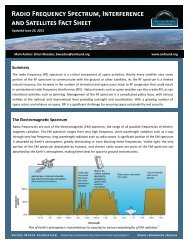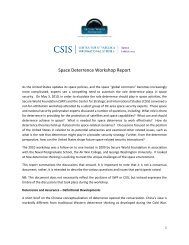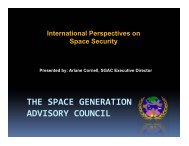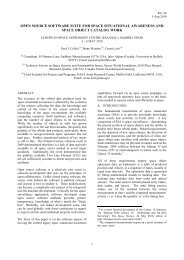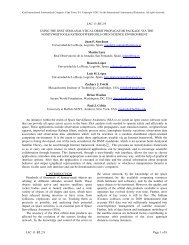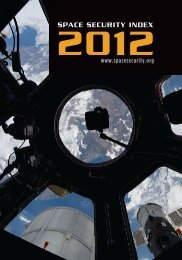Space Security Index
Space Security Index
Space Security Index
You also want an ePaper? Increase the reach of your titles
YUMPU automatically turns print PDFs into web optimized ePapers that Google loves.
Commercial <strong>Space</strong><br />
is chapter assesses trends and developments in the commercial space sector, which<br />
includes manufacturers of space hardware such as rockets and satellite components, providers<br />
of space-based information such as telecommunications and remote sensing, and service<br />
operators for space launches. Also covered in this chapter are the developments related to<br />
the nascent space tourism industry, as well as the relationship between commercial operators<br />
and the public sector.<br />
e commercial space sector has experienced dramatic growth over the past decade, largely as<br />
a result of rapidly increasing revenues associated with satellite services provided by companies<br />
that own and operate satellites, as well as the ground support centers that control them. is<br />
growth has been driven by the fact that space-based services that were once the exclusive<br />
purview of governments, such as satellite-based navigation, are now widely available for<br />
private customers. In 2010 alone, the world satellite industry had revenues in excess of<br />
$168-billion. 1 As well, companies that manufacture satellites and ground equipment have<br />
contributed signicantly to the growth of the commercial space sector. is includes both<br />
direct contractors that design and build large systems and vehicles, smaller subcontractors<br />
responsible for system components, and software providers.<br />
is chapter also assesses trends and developments associated with access to space via<br />
commercial launch services. In the early 2000s, overcapacity in the launch market and<br />
a reduction in commercial demand combined to depress the cost of commercial space<br />
launches. More recently, an energized satellite communication market and launch industry<br />
consolidation have resulted in stabilization and an increase in launch pricing. Revenues from<br />
23 commercial launch events in 2010 were close to $2.45-billion, 2 an increase of $43-million<br />
over 2009. 3<br />
is chapter also examines the relationships between governments and the commercial<br />
space sector, including the government as partner and the government as regulator, and<br />
the growing reliance of the military on commercial services. Governments play a central<br />
role in commercial space activities by supporting research and development, subsidizing<br />
certain space industries, and adopting enabling policies and regulations. Indeed, the space<br />
launch and manufacturing sectors rely heavily on government contracts. e retirement<br />
of the space shuttle in the U.S., for instance, will likely open up new opportunities for the<br />
commercial sector to provide launch services for human spaceight. Conversely, because<br />
space technology is often dual-use, governments have sometimes taken actions such as the<br />
imposition of export controls, which impact the growth of the commercial market. ere is<br />
also evidence that commercial actors are engaging governments on space governance issues,<br />
in particular space trac management and best practices, and space situational awareness.<br />
<strong>Space</strong> <strong>Security</strong> Impact<br />
e role that the commercial space sector plays in the provision of launch, communications,<br />
imagery, and manufacturing services, as well as its relationship with government, civil, and<br />
military programs, make this sector an important determinant of space security. A healthy<br />
space industry can lead to decreasing costs for space access and use, and may increase the<br />
accessibility of space technology for a wider range of space actors. is has a positive impact<br />
on space security by increasing the number of actors that can access and use space or spacebased<br />
applications, thereby creating a wider pool of stakeholders with a vested interest in<br />
the maintenance of space security. Increased commercial competition in the research and<br />
development of new applications can also lead to the further diversication of capabilities<br />
to access and use space.<br />
Commercial <strong>Space</strong><br />
CHAPTER FIVE<br />
97



